每周一测-学易试题君之每日一题君2018学年下学期七年级英语人教版(课堂同步系列二) (3)
feed和worry的用法-学易试题君之每日一题君2018学年下学期七年级英语人教版(课堂同步系列二)

11. Insects __________ plants.A. feed inB. food onC. feed onD. feed of【参考答案】C【解题必备】feed…to ...; feed…on(with)...; feed on这三个词组都有"喂食"的意思,但使用时须注意区别:(1)feed...to...中的feed 是及物动词,其后接饲料或食物名词作宾语,to 为介词,其后一般接动物或小孩等名词表示对象,其词组意思是:把……喂给……吃。
如:Please feed some grass to the cow.请给牛喂点草。
学科&网She has fed milk to the baby.她已给婴儿喂过奶。
(2)feed...on... 中的feed 也是及物动词,其后接人或动物名词作宾语,on 后接食物或饲料名词,其词组表示"用……喂……"。
on 可与with 替换。
如:The child was feeding the monkey on/with a banana.那孩子用香蕉喂猴子。
(3)feed on 中的feed 为不及物动词,意思是"食、吃"(主要指动物,若指人则为口语或诙谐用语),与介词on 连用构成及物动词词组,其词组意思是"以……为食,靠……为生",其主语主要用来指动物,也可用于指婴儿,其宾语通常是食物或饲料名词。
如:Cattle feed mostly on grass. 牛以草为主食。
feed on 与live on 同义,但live on 主要用于指人,以人作主语,常以表示食物、工资、钱等的名词作宾语。
如:。
每周一测-学易试题君之每日一题君2018学年下学期七年级英语人教版(期末复习)
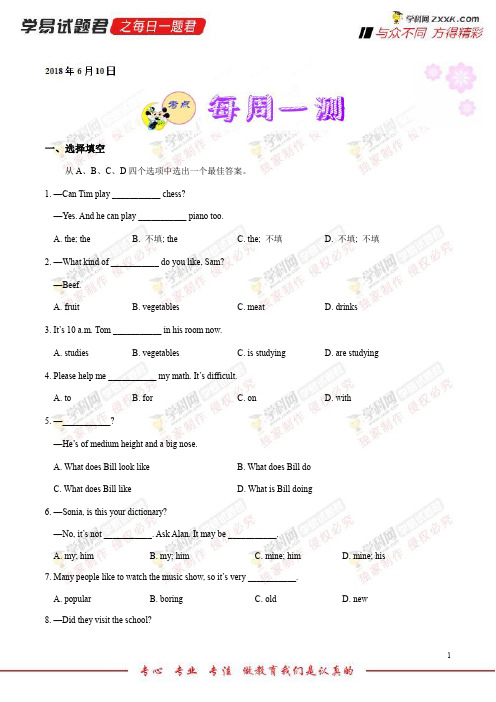
A. in front ofB. across fromC. underD. between
6.—Sonia,is this your dictionary?
—No,it’s not___________.Ask Alan.It may be___________.
A.my;himB.my;himC.mine;himD.mine;his
7.Many people like to watch the music show,so it’s very___________.
Yours,
Lisa
16. A.leaveB.likeC.learnD.have
17. A.rulesB.boxesC.clothesD.numbers
A.toB.forC.onD.with
5.—___________?
—He’s of medium height and a big nose.
A.What does Bill look likeB.What does Bill do
C.What does Bill likeD.What is Bill doing
一、选择填空
从A、B、C、D四个选项中选出一个最佳答案。
1.—Can Tim play___________chess?
—Yes.And he can play___________piano too.
A.the;theB.不填;theC.the;不填D.不填;不填
辨析sothat和sothat-学易试题君之每日一题君2018学年下学期七年级英语人教版(课堂同步系列二)

1We got up early __________ we could catch the early bus.A. so thatB. so…thatC. such…thatD. in order to【参考答案】A【解题必备】so…that…意为"如此……以至于……",其中so 是副词,常用来修饰形容词或者副词,that 从句既可以是肯定句也可以是否定句。
常用句型为:主语+谓语+so+形容词/副词+that 从句。
学%科网 He runs so fast that I can ’t catch him. 他跑得如此快以至于我追不上他。
The question is so easy that I can work it out. 这个问题如此简单以至于我能做出来。
【拓展】"so…that "可以和"too…to…"互换。
Paul is too young to go to work.= Paul is so young that he can ’t go to work.保罗太小了不能上班。
【辨析】so...that...与so that so...that... 意为"如此……以至于……",so后接形容词或副词,that 引导结果状语从句。
She was so busy that she had no time to rest. 她如此忙,以至于没有时间休息。
so that so that 引导目的状语从句,意为"以便;为了",从句中常用can/could/may/should 等情态动词。
The little boy saved money so that he could buy his mother a present onMother ’s Day. 小男孩攒钱以便可以在母亲节给母亲买一件礼物。
usually和never的用法-学易试题君之每日一题君2018学年下学期七年级英语人教版(课堂同步系列一)

1
1. Mike ___________ to school.
A. usually walks
B. walks usually
C. usually walk
D. walk usually 【参考答案】A
【试题解析】usually 为副词,对动词的数没有影响,所以由主语Mike 确定动词为三单形式;而usually 通常放在主语之后谓语动词之前,如果是系动词的话则放在系动词之后。
学科&网
【解题必备】
usually 是频度副词,意为"通常、一般",在句中作状语,一般位于实义动词之前,连系动词be 、助动词或者情态动词之后。
►I usually have lunch at school.
►He usually goes to school by bike.
2. Mr. Wang ___________ gets up early. So he is ___________ late for work.
A. always; always
B. never; never
C. always; never 【参考答案】
C
【解题必备】
never 副词,意为"从不;决不";常置于系动词be 、助动词或情态动词之后,实义动词之前。
My parents are never late for work. 我父母上班从来不迟到。
He never goes to work so late. 他从不这么晚去上班。
每周一测-学易试题君之每日一题君2018学年下学期七年级英语人教版(期中复习) (2)
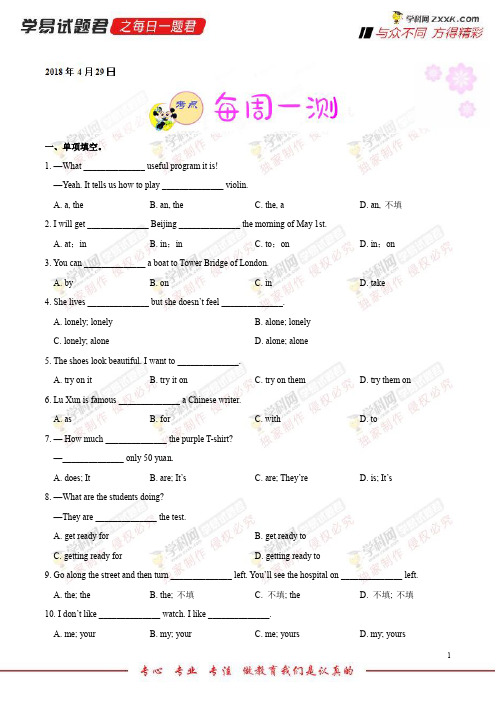
16.A.toB.throughC.onD.past
17.A.flyB.walkC.driveD.swim
18.A.plansB.picturesC.filmsD.books
19.A.myB.yourC.hisD.her
20.A.andB.soC.but alsoD.or
三、阅读理解。
A
Many people like to travel by plane. Planes are fast(快的), but I don’t like it because an airport is usually far from the city. You have to get there early and wait for hours for the plane to go and it is often late. You can’t open the windows. Planes are fast but it still takes you many hours to go out of the airport and into the city center.
6.Lu Xun is famous______________a Chinese writer.
A. asB. forC. withD. to
周末培优-学易试题君之每日一题君2018学年下学期七年级英语人教版(课堂同步系列二) (5)

1There __________ many apples on the tree last year.A. have beenB. wereC. areD. is【参考答案】B【解题必备】There be 句型的常考点:考点一:各种句型转化。
1. 变成否定There be 句型的否定式的构成和含有be 动词的其它句型一样,在be 后加上not 或no 即可。
注意not 和no 的不同:not 是副词,no 为形容词,not a/an/any + n. 相当于no+ n.。
例如:There are some pictures on the wall. →There aren ’t any pictures on the wall. =There are no pictures on the wall. There is a bike behind the tree. → There isn ’t a bike behind the tree. =There is no bike behind the tree.2. 变成一般疑问句There be 句型的一般疑问句变化是把be 动词调整到句首,再在句尾加上问号即可。
但同时要注意:当肯定句中有some 时,要将其改为any (否定变化也一样)。
There is some water on Mars. → Is there any water on Mars?There are some fish in the water. →Are there any fish in the water?3. 特殊疑问句对主语提问:当主语是人的时候,则用who 引导,当主语是物的时候,则用what 引导。
注意:无论原句的主语是单数还是复数,对之提问时一般都用be 的单数形式(回答时却要根据实际情况来决定)。
如:。
as和putup的用法-学易试题君之每日一题君2018学年下学期七年级英语人教版(课堂同步系列二)

1
1. __________ years go by, China is getting stronger and richer
A. When
B. As
C. While
D. Since 【参考答案】
B
【解题必备】
as 作介词,意为"作为,当作",其后可以接表示职业、用途等的名词。
用在句首时,这种短语的后面往往有逗号与语句的主体隔开。
He works as an actor. 他是一名演员。
As a student, you should study hard. 作为一名学生,你应当努力学习。
【拓展】as 还可以作连词,其用法为:
(1)"当……时候",引导时间状语从句。
We sing as we go home. 我们回家的时候唱着歌。
(2)"因为,由于",引导原因状语从句。
We all believe him as he is an honest boy. 我们都相信他,因为他是一个诚实的男孩。
(3)"照……方式",引导方式状语从句。
Please do as your teacher says. 请按你老师说的去做。
2. Where is the tent? Let ’s __________?
A. put up it
B. put them up
C. put it up
D. put up them 【参考答案】C
【试题解析】句意:帐篷在哪里?让我们把它撑起来吧。
此处用it 代替前面出现的单数名词the tent ,put up 为动副词组,代词放中间,故选C 。
学&科网
【解题必备】。
2018年7月1日 每周一测-学易试题君之每日一题君2017-2018学年下学期七年级英语人教版

2018年7月1日每周一测一、单项选择。
1. Miss Smith is very kind. We all like __________.A. itB. herC. himD. them【答案】B【解析】试题分析:句意:史密斯老师非常好心。
我们都喜欢她。
A. it 它;B. her 她;C. him 他;D. Them 他们,根据句意及题干分析此空作like的宾语,所以用宾格,Miss Smith是女性,所以用her,故选B。
考点:考查代词的用法视频2. We usually have the first class __________ 8:00 in the morning.A. ofB. inC. onD. at【答案】D【解析】试题分析:句意:我们通常在早上8点上第一节课。
根据句意及题干分析具体到某一时刻要用介词at,故选D。
考点:考查介词的用法视频3. How long does it __________ you to get to the nearest train station?A. takeB. spendC. costD. pay【答案】A【解析】句意:到达最近的火车站你需要多长时间?根据句型It takes sb some time to do sth做某事花费某人时间,故选A。
点睛:sb spends time/money doing sth某人做某事花费时间/钱;sth costs sb money某物花费某人钱;sb pays money for sth某人为某物支付钱;It takes sb time to do sth做某事花费某事时间。
4. I will ask my teachers for help __________ I have any problem.A. whenB. whereC. whoseD. which【答案】A【解析】句意:我有问题时,我将要求助于老师。
周末培优-学易试题君之每日一题君2018学年下学期七年级英语人教版(课堂同步系列二)

1It was ___________ lovely weather ___________ we decided to spend the day on the beach.A. too; toB. such; thatC. so; that【参考答案】B【解题必备】1. so...that...用于以下四个句型:so+形容词/副词+that...so+形容词+a/an+单数可数名词+that...so+ many(多) / few(少) +复数可数名词+that...so+ much(多) /little(少) +不可数名词+that...This teacher is so kind that we all like him. 这个老师非常和蔼,我们都喜欢他。
He ran so quickly that we all couldn ’t catch up with him. 他跑得很快,我们都追不上他。
This is so interesting a book that we all enjoy reading it. 这本书非常有趣,我们都喜欢看。
He has so many books that I can ’t count them. 他有很多书,我数也数不清。
There was so much food that we couldn ’t eat it all. 食物太多了,我们吃不完。
I have so little money that I cannot afford a car. 我的钱太少,买不起车。
注:若little 表示"小"时,要用such 。
如:He is such a little boy that he can ’t lift the box. 他是这么小的小小孩,提不动那个箱子。
2. such...that...用于以下三个句型:。
每周一测-学易试题君之每日一题君2018学年下学期七年级英语人教版(期末复习) (2)

三、阅读理解。
A
Mr. Smith lives in a village(村庄), but he works in a big city. He goes to work by train every morning and comes home in the same way.
15.A. happyB. goodC. funD. difficult
16.A. takesB. bringsC. buysD. sells
17.A. goB. goesC. goingD. to go
18.A. themB. himC. itD. us
19.A. afternoonB. morningC. eveningD. night
10.How do you usually go to school? I usually go to school__________.
A. by mybikeB. by bikesC. by bikeD. by a bike
二、完形填空。
My brother Jerry is a clerk at a clothes store. He works very11hours every day. He usually12at six in the morning. After he brushes his13, he starts to14for thirty minutes. He thinks runningis15for his health. Then he has breakfast. After breakfast, he16a bus to work. He is very busy. He has no time17home for lunch, so he eats18at the store. In the19, he works for four hours. He has dinner at home. On weekends, he is not busy. He usually goes to the movies20me.
begoodat和begoodwith的用法-学易试题君之每日一题君2018学年下学期七年级英语人教版(课堂同步系列一)

1 2018年2月28日
中考频度:★★★☆☆ 难易程度:★★★☆☆
1. Kate does well in singing.
A. is good for
B. is good at
C. is good with
【参考答案】
B
2. —Peter, __________ your cousin good at science?
—Yes, he is. He often helps me with my science.
A. do
B. does
C. are
D. is
【参考答案】D
【试题解析】句意:——皮特,你的表兄擅长科学吗?——是的,他是。
他经常帮助我学科学。
be good at 擅长。
故选D 。
学科@网
【解题必备】
be good at 擅长……
►She is very good at music. 她擅长音乐。
(1)be good at sth. 在某方面擅长
be good at doing sth. 擅长做某事
►He is good at English. 他擅长英语。
►She is good at singing. 她擅长唱歌。
(2)be good at 的同义短语为do well in 。
►He is good at playing chess. = He does well in playing chess. 他擅长下国际象棋。
(3)辨析be good at ,be good for ,be good to 与be good with。
每周一测-学易试题君之每日一题君2018学年下学期七年级英语人教版(课堂同步系列二) (5)

C.too much;too manyD.too much;too much
8.David sits ___________ Lucy. He is very tall, so she can’t see the screen(屏幕).
My name is Linda.In my neighborhood there’s a big park.Lots of people go there to have fun.I like to play there,too.There is a restaurant across from the park.A bank is next to the restaurant.And some clothes stores are near the bank.
三、阅读理解。
A
My name is Sam.This is my neighborhood.There’s a big supermarket near my house.My mother often goes shopping there.Across from the supermarket is a school.It’s my school.There is a library next to the school.I like reading books there.
I am Peter.My neighborhood is busy.There are a lot of stores and restaurants in my neighborhood.My house is on a street corner(街角).There is a post office near it.And next to the post office is a pay phone.
miss和wish的用法-学易试题君之每日一题君2018学年下学期七年级英语人教版(课堂同步系列一)

Don’t ___________ the chance when you can catch it, or you will regret.
A. guess
B. miss
C. remember
D. allow
【参考答案】B
【解题必备】
miss/mɪs/ v. 怀念,思念;错过
(1)miss作及物动词,意为"怀念;思念",其第三人称单数形式为misses。
I miss my mother very much. 我非常想念我的母亲。
(2)miss还有一些其他意思,如下:
作及物动词,意为"错过"。
He arrived too late and missed the train.他到得太晚,没赶上火车。
Miss Sun is our English teacher. 孙老师是我们的英语老师。
首字母大写,即Miss,意为"小姐,
老师",常用于未婚女性的姓氏前。
2. —What are you going to be when you grow up?
—A singer, but my parents wish me ___________ a teacher.
A. am
B. to be
C. will be
D. be
【参考答案】B
【试题解析】句意:"你长大后打算做什么?""歌手,但我的父母希望我成为一名老师。
"wish sb. to do sth."希望某人做某事",所以选择B。
学科.网
【解题必备】
【辨析】wish与hope
1。
somuch和somany的用法-学易试题君之每日一题君2018学年下学期七年级英语人教版(课堂同步系列二)

11. There were __________ people in the park, but it was __________ fun.A. so much ;too manyB. too much ;so muchC. too many ;so muchD. too many ;so many【参考答案】C2. Can you eat __________ beef once?A. so manyB. so muchC. someD. many【参考答案】B【试题解析】句意:你曾经吃过很多牛肉吗?。
beef 牛肉为不可数名词,排除A 和D ,在一般疑问词中,此话不是"表示建议并希望得到对方肯定回答",根据句意,故选B 。
学科#网【解题必备】so many 用来修饰可数名词,so much 用来修饰不可数名词,这两个词组通常与that 连用。
There was so much noise outside that we couldn ’t hear the teacher. 外面嘈杂声很大,以致我们不能听到老师的话。
He had so many falls that he was black and blue all over. 他跌了这么多的跤,以致全身青一块、紫一块的。
so manyso+ adj. so 为副词The weather is so nice that all of us want to go to the park. 天气如此好,我们都想去公园。
such + adj. such 为形容词It ’s such nice weather that all of us want to go to the park. 天气如此好,我们都想去公园。
总得来说,so 后面直接跟形容词,后面+that+名词,such 后面加形容词后+名词再加that 。
辨析spendtakecost和pay-学易试题君之每日一题君2018学年下学期七年级英语人教版(课堂同步系列二)
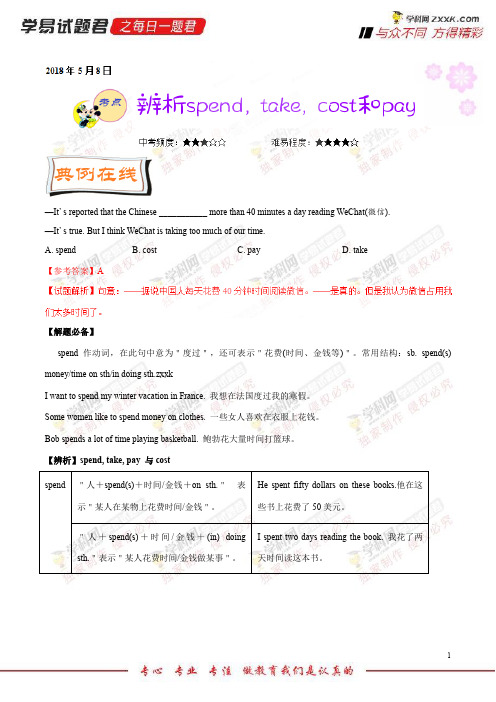
1
—It ’ s reported that the Chinese ___________ more than 40 minutes a day reading WeChat(微信).
—It ’ s true. But I think WeChat is taking too much of our time.
A. spend
B. cost
C. pay
D. take
【参考答案】
A
【解题必备】
spend 作动词,在此句中意为"度过",还可表示"花费(时间、金钱等)"。
常用结构:sb. spend(s) money/time on sth/in doing sth.zxxk
I want to spend my winter vacation in France. 我想在法国度过我的寒假。
Some women like to spend money on clothes. 一些女人喜欢在衣服上花钱。
Bob spends a lot of time playing basketball. 鲍勃花大量时间打篮球。
【辨析】spend, take, pay 与cost spend "人+spend(s)+时间/金钱+on sth." 表
示"某人在某物上花费时间/金钱"。
He spent fifty dollars on these books.他在这些书上花费了50美元。
"人+spend(s)+时间/金钱+(in) doing
sth."表示"某人花费时间/金钱做某事"。
I spent two days reading the book. 我花了两天时间读这本书。
辨析infrontof和inthefrontof-学易试题君之每日一题君2018学年下学期七年级英语人教版(课堂同步系列二)

1—Why are you standing, Alice?—I can ’t see the blackboard clearly. Two tall boys are sitting ___________ me.A. behindB. next toC. betweenD. in front of【参考答案】D【辨析】 in front of 与in the front ofin the front of... 在……(里面的)前部反义词组 at the back of...在……后面in front of...在……(外部的)前面反义词 behind 在……后面The driver is in the front of the bus. 司机在公共汽车的前部。
The cat is in front of the bus. 那只猫在公共汽车的前面。
1. There are some trees ___________ the classroom and there is a blackboard ___________ it.A. in front of; in front ofB. in front of; in the front of;C. in the front of; in front of2. The teacher ’s desk is ___________ our classroom and our English teacher likes standing ___________ it .A. in front of; in the front ofB. in front of; in front ofC. in the front of; in front ofD. in the front of; in the front of3. —There is a desk ___________ the hall.。
notatall的用法-学易试题君之每日一题君2018学年下学期七年级英语人教版(课堂同步系列二)
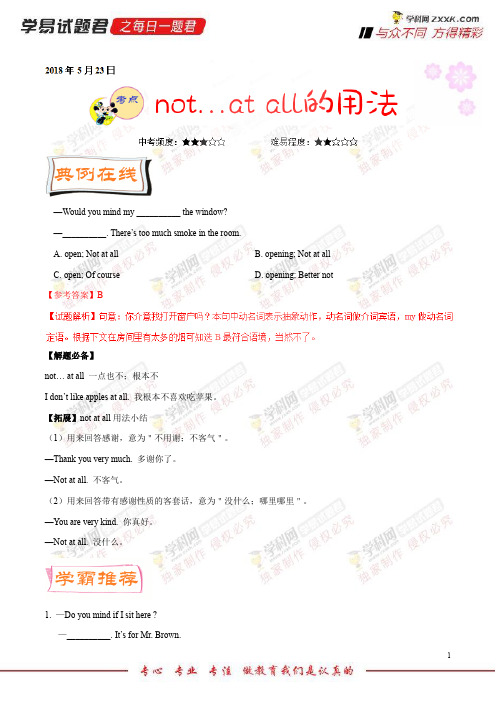
—You are very kind.你真好。
—Not at all.没什么。
1.—Do you mind if I sit here ?
—__________.It’s for Mr. Brown.
A.Not at allB.In the slightest C.Better notD.of course not
【参考答案】B
【解题必备】
not… at all一点也不;根本不
I don’t like apples at all.我根本不喜欢吃苹果。
【拓展】not at all用法小结
(1)用来回答感谢,意为"不用谢;不客气"。
—Thank you very much.多谢你了。
—Not at all.不客气。
A.not at allB. in the slightestC. not all atD. at not all
4. —How is it going, Miller?
—__________, thanks.
A. Not at allB. SureC. Yes, goodD. Not bad
5. —Do ቤተ መጻሕፍቲ ባይዱou mind if I sit here?
学易试题君之每日一题君2017-2018学年下学期七年级英语人教版(课堂同步系列二)
专题下载链接:/a762774.html
链接打开方法:
1、按住ctrl键单击链接即可打开专题链接
2、复制链接到网页
—__________.It’s for Miss Wood.
A.Not at allB.Never mindC.You’d better notD. Of course not
辨析each和every-学易试题君之每日一题君2018学年下学期七年级英语人教版(课堂同步系列二)
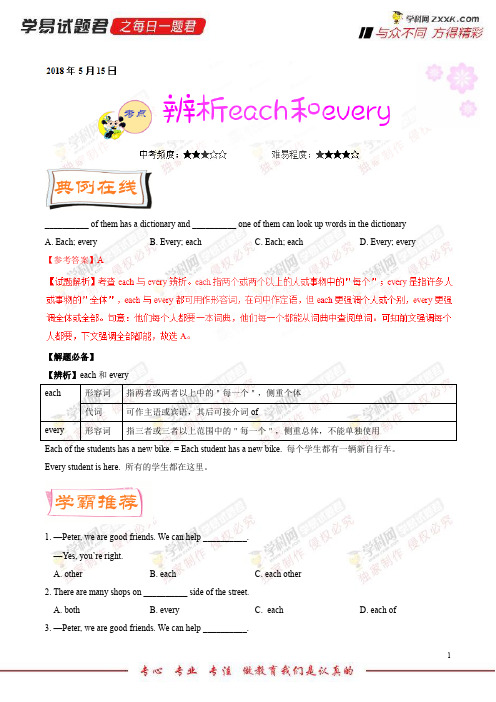
A. Each;everyB. Every;eachC. Each;eachD. Every;every
【参考答案】A
【解题必备】
【辨析】each和every
each
形容词
指两者或两者以上中的"每一个",侧重个体
代词
可作主语或宾语,其后可接介词of
every
形容词
指三者或三者以上范围中的"每一个",侧重总体,不能单独使用
Each of the students has a new bike. = Each student has a new bike.每个学生都有一辆新自行车。
学易试题君之每日一题君2017-2018学年下学期七年级英语人教版(课堂同步系列二)
专题下载链接:/a762774.html
链接打开方法:
1、按住ctrl键单击链接即可打开专题链接
2、复制链接到网页
5. C【解析】考查代词。句意:在街道的两边有许多商店。each side表示街的两边;every用于三者或三者以上的每一个Байду номын сангаасboth表示两者,但side需用复数。故选C。
今天的题你做对了吗?如果没做对,为什么呢?
________________________________________________________________________________________________________________________________________________________________________________________________________________________________________________________________________________________________________________________________________________________________________________________________________________
每周一测-学易试题君之每日一题君2018学年下学期七年级英语人教版(期末复习) (3)

Jack thought for a while and15."After school I went fishing myself,"he said."I didn’t think I would have any16. But I did. I caught a fish!"
"I’m glad you had a good time,"said Mr. Green."Try to think about it until(直到) you go to sleep. Now I’m going to17the light. I hope I will see a happy boy tomorrow. Good night!"
A. takeB. tookC. will takeD. are taking
9.Peter is very tired,____he doesn’t want to go to bed.
A. andB. butC. soD. and
10. —____water do you have?
—Just a bottle.
Sometimes he has to think19to find the best thing. Sometimes it is a veபைடு நூலகம்y small thing. But he always finds one good thing to think about. This is a good way Tom’s father taught him to20his day.
周末培优-学易试题君之每日一题君2018学年下学期七年级英语人教版(课堂同步系列二) (4)
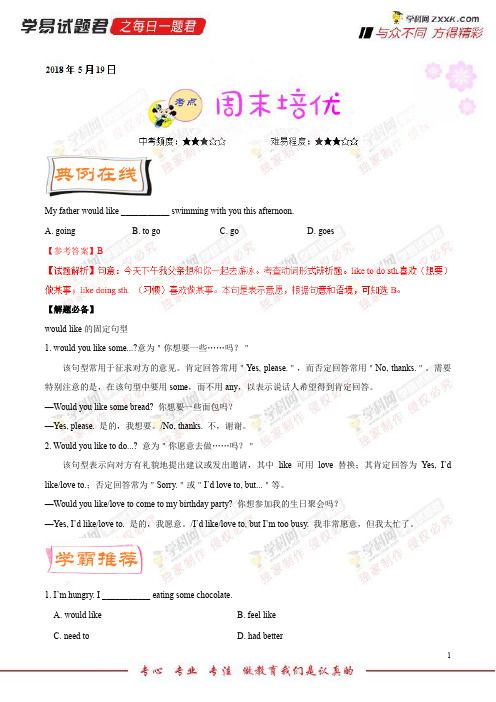
1My father would like ___________ swimming with you this afternoon.A. goingB. to goC. goD. goes【参考答案】B【解题必备】would like 的固定句型1. would you like some...?意为"你想要一些……吗?"该句型常用于征求对方的意见。
肯定回答常用"Yes, please.",而否定回答常用"No, thanks."。
需要特别注意的是,在该句型中要用some ,而不用any ,以表示说话人希望得到肯定回答。
—Would you like some bread? 你想要一些面包吗?—Yes, please. 是的,我想要。
/No, thanks. 不,谢谢。
2. Would you like to do...? 意为"你愿意去做……吗?"该句型表示向对方有礼貌地提出建议或发出邀请,其中like 可用love 替换;其肯定回答为Yes, I ’d like/love to.;否定回答常为"Sorry."或"I ’d love to, but..."等。
—Would you like/love to come to my birthday party? 你想参加我的生日聚会吗?—Yes, I ’d like/love to. 是的,我愿意。
/I ’d like/love to, but I ’m too busy. 我非常愿意,但我太忙了。
1. I ’m hungry. I ___________ eating some chocolate.A. would likeB. feel likeC. need toD. had better。
- 1、下载文档前请自行甄别文档内容的完整性,平台不提供额外的编辑、内容补充、找答案等附加服务。
- 2、"仅部分预览"的文档,不可在线预览部分如存在完整性等问题,可反馈申请退款(可完整预览的文档不适用该条件!)。
- 3、如文档侵犯您的权益,请联系客服反馈,我们会尽快为您处理(人工客服工作时间:9:00-18:30)。
A.areB.isC.beD.am
7.Look! Who ____________ there the river.
A.swimB.swimsC.is swimmingD.are swimming
C.It sounds greatD.It’s sunny and hot
3.—____________?
—It’s cold and humid.
A.How is the weather liketoday?B.What is the weather like?
C.What day is it today?D.What’s the date today?
A.playsB.to playC.to playingD.play
10.Some of the juice ____________ good. It’s bad ____________ your health.
A.aren’t; forB.aren’t; atC.isn’t; forD.isn’t; at
4.____________ a cold morning, he went to France.
A.InB.OnC.AtD.Of
5.It’s ____________ outside now. You had better put on your coat.
A.warmB.hotC.rainyD.cold
In England, people can also have summer in winter, or have winter in summer. So in19they can swim sometimes, and in summer sometimes you can see people20warm clothes.
15. A.WhatB.WhereC.HowD.Why
16. A.SundayB.winterC.rainD.snow
17. A.coolB.hotC.warmD.cold
18. A.sunnyB.hotC.rainyD.cloudy
19. A.springB.summerC.autumnD.winter
15is it so? Because the weather is changeable(多变的) in England. People there can have spring, summer, autumn and16in a day. When they get on the bus, the weather is sunny and17just like in spring. However, when they get out of the bus, it can be18and cold. At noon, the weather will be sunny and a little hot, and it will be summer at this time of a day.
二、完形填空。
When you go to England, you can be surprised11people take an umbrella(伞) or a raincoat(雨衣)12them on a sunny morning.
On a bus or a train, you can usually see13is looking out of the window or reading newspapers. They don’t talk much. When you meet English people, they often talk about one thing—the14.
一、单项选择。
1.I like the weather here. It’s always ____________.
A.funnyB.sunnyC.terribleD.windy
2.—How is the weather in Shanghai?
—____________.
A.It’s a big cityB.I like it very much
8.—Could you help me carry the chair to my office?
—____________. It’s a piece of cake.
A.No problemB.I’m afraid not
C.You’re welcomeD.Not at all
9.He is happy ____________basketball with hisclassmates after school.
20. A.takingB.sellingC.buyD.takes
三、阅读理解。
A
When you go to the US, someone often says"Give me five". What should you do? Do not get five dollarsfrom your pocket! It will make themlaugh! They are not asking for your money, but your fingers. In the US,"give me five"or"give me the high five"is a popular gesture(手势). You can see it often in movies or on TV. It means hitting each other’sright hand together.
11. A.muchB.manyC.a lots ofD.lot of
12. A.onB.toC.forD.with
1 3. A.many peopleB.everyoneC.all the peopleD.some of the people
14. A.weatherB.newspapersC.windowsD.books
